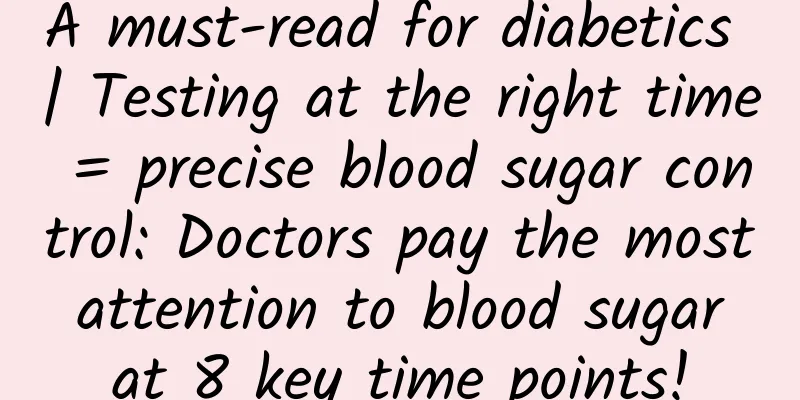A must-read for diabetics | Testing at the right time = precise blood sugar control: Doctors pay the most attention to blood sugar at 8 key time points!

|
Many diabetics know the importance of monitoring blood sugar at home. But I can't figure out which time point to measure Blood sugar data is not up to standard, and it needs to be retested during follow-up visits, which wastes a lot of time In fact, blood sugar monitoring is divided into multiple time points such as before meals, after meals, before bedtime, and at night Different situations correspond to different time points The following details the applicable scenarios and groups at each time point 1. Before breakfast (commonly known as fasting) • Those with high blood sugar levels • Those at risk of hypoglycemia •Those who use basal insulin therapy (such as glargine, detemir insulin, etc.) • Patients who use premixed insulin (such as 30R, 70/30, etc.) 2. Before lunch • Those receiving short-term intensive insulin therapy (such as basal insulin before three meals, 3 doses of premixed insulin, etc.) 3. Before dinner • Patients taking premixed insulin 4. 1 hour after meal • Hyperglycemia during pregnancy 5. 2 hours after meal •Fasting blood sugar has been well controlled, but glycosylated hemoglobin is still not up to standard • Those who need to understand the effects of diet and exercise on blood sugar 6. Before bed • Elderly patients with diabetes (≥60 years old) • Patients who are currently taking medications that increase the risk of hypoglycemia (e.g., glinides, sulfonylureas) • People who inject insulin (especially before dinner) 7. Nighttime (2-3 am) • Suspected of nocturnal hypoglycemia • Those whose fasting blood sugar is still high even though they have almost reached the target with insulin therapy 8. Special circumstances (immediate blood sugar measurement required) • If you experience symptoms of hypoglycemia (such as palpitations, anxiety, sweating, dizziness, tremors, hunger, changes in consciousness, cognitive impairment, convulsions, and coma) • Before and after strenuous exercise •After drinking (especially drinking on an empty stomach, which can easily cause hypoglycemia) • When you do not eat on time • Before driving a car for a long distance (or operating other dangerous equipment) • When acute infection occurs (such as pneumonia, vomiting, diarrhea, etc.) Special reminder from doctors 1. The key to accurate blood sugar monitoring lies in personalization, and different situations correspond to different monitoring time points! 2. Follow the plan prepared by the doctor and avoid adjusting the monitoring frequency or missing key nodes on your own! 3. When monitoring results are abnormal or changes occur in your life, be sure to consult a doctor to adjust your plan! 4. Scientific monitoring and cooperation between doctors and patients are the double insurance for achieving blood sugar control standards! Note: The content of this article is based on the "Guidelines for the Prevention and Treatment of Diabetes in China (2024 Edition)" and other public medical literature. It is only used for health education and cannot replace diagnosis and treatment! |
Recommend
Is facial slimming harmful to the body?
The face is the part that leaves a deep impressio...
The Mystery of 17 Weeks Pregnancy
Around 17 weeks of pregnancy is a critical period...
What are the dangers of high heels
High heels can be said to be a must-have shoe for...
Is lung cancer already in the middle or advanced stages when it is first discovered? One method may prevent it
Today is February 4th, which is also World Cancer...
Why is my period blood black?
Period is the common name for menstruation. Menst...
Lei Xiao: What preparations do patients and their families need before PET/CT examination?
In my country, PET/CT examinations are widely use...
How to care for breasts scientifically?
Author: Wang Jing: Professor, Chief Physician, Na...
What to do if mosquito bites cause redness and swelling? Mosquito repellent measures must be reliable, and the home environment is very important
Summer is the season for men to show off their ch...
Common knowledge and misunderstandings that diabetics should know
Among neurological diseases, many patients have a...
How many days does a cesarean section hurt? How many days does a cesarean section not hurt?
The reason why more and more women choose caesare...
What should I do if I have proteinuria? This article will teach you how to solve it
Proteinuria is the most common manifestation of k...
What to do if you have kidney stones and back pain during pregnancy
Kidney stones can be said to be the most serious ...
38 weeks of pregnancy, strong and powerful fetal movement
At 38 weeks of pregnancy, the fetus has fully gro...









